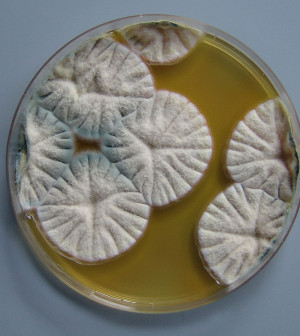- The Best Time of Day to Drink Bone Broth to Maximize Health Benefits
- 8 Ways to Increase Dopamine Naturally
- 7 Best Breads for Maintaining Stable Blood Sugar
- Gelatin vs. Collagen: Which is Best for Skin, Nails, and Joints?
- The Long-Term Effects of Daily Turmeric Supplements on Liver Health
- Could Your Grocery Store Meat Be Causing Recurring UTIs?
- Are You Making This Expensive Thermostat Error This Winter?
- Recognizing the Signs of Hypothyroidism
- 10 Strategies to Overcome Insomnia
- Could Artificial Sweeteners Be Aging the Brain Faster?
Researchers Explore New Target for Malaria Vaccine


Scientists have developed a new vaccine for malaria using protective immune system cells from children who appear to be naturally resistant to the deadly infectious disease. Initial tests of the vaccine in mice looked promising, according to a new study.
Certain children are naturally resistant to the mosquito-borne infectious disease. And, it was recently discovered that these children harbor certain protective immune system cells (antibodies). These antibodies are programmed to block the malaria parasite from getting out of red blood cells, where they can multiply and cause more serious disease.
The researchers created a vaccine with these antibodies. And, when given to mice, the vaccine offered some protection against malaria. When the animals were given a malaria strain that is universally fatal to mice, the vaccinated rodents developed lower levels of the malaria parasite and survived longer than unvaccinated mice, according to the study.
The findings, reported in the May 23 issue of Science, are just an early step toward a potential malaria vaccine.
However, because this approach was developed from research in humans, experts have more confidence than they normally would that the findings from the mouse trials will translate to humans, according to lead researcher Dr. Jonathan Kurtis, director of the Center for International Health Research at Rhode Island Hospital in Providence.
An infectious diseases expert who reviewed the study said the results should be viewed with some caution, because history shows that animal findings often fail to extend to humans.
“But this does look very exciting,” said Dr. William Schaffner, a professor of preventive medicine at Vanderbilt University in Nashville, and a spokesman for the Infectious Diseases Society of America.
A vaccine against malaria is one of the “holy grails” in infectious disease research, Schaffner said.
Malaria is a life-threatening illness caused by a parasite, according to the World Health Organization (WHO). The parasite gets into humans via a bite from an infected mosquito.
Worldwide, about 207 million people were infected with malaria in 2012, according to the WHO. It’s estimated that almost 630,000 of those individuals died — mostly children in sub-Saharan Africa. Despite huge declines in malaria deaths, the WHO estimates that one child dies from malaria every minute in Africa.
“This is the biggest, single-agent killer of children worldwide,” Kurtis said.
One of the reasons malaria remains so deadly is that the parasite has developed resistance to currently available treatments, according to the WHO. Mosquito netting and insecticides offer some protection against malaria transmission, but the parasite has also developed resistance to some insecticides, reports the WHO.
And while there are 50 to 100 malaria vaccines in various stages of development, Kurtis said, most of them are targeted against just a few malaria parasite antigens.
Antigens are proteins on a foreign invader, like a parasite, that trigger the immune system to form defensive antibodies. Exposing a person to an antigen via vaccine can train the immune system to quickly identify that antigen when the real infection invades.
To find a new antigen for a malaria vaccine, Kurtis and colleagues basically “worked backwards,” Schaffner said.
They started with blood samples from two dozen 2-year-olds from Tanzania who’d either been sick with malaria or proved resistant to the illness, despite living among malaria-carrying mosquitoes.
The resistant children, it turned out, had natural antibodies to a malaria parasite antigen dubbed PfSEA-1.
That antigen has an important role in the parasite’s ability to make people sick. Once it’s in the human body, the parasite goes through what’s known as the schizont stage, where it is contained within red blood cells before it ruptures and spills out into the bloodstream. The PfSEA-1 antigen normally allows the parasite to exit the red blood cells; but the antibodies found in the resistant Tanzanian children keep the parasite trapped in those cells.
“They used a very clever method to determine which characteristics of the human immune response were important,” Schaffner said.
Still, there is a long research road ahead. Kurtis said the vaccine is being studied further in animals, and the hope is to start an early stage human trial soon. But he said it could be a decade before the work leads to a real-world vaccine.
Any such vaccine would be “imperfect,” Schaffner noted. That is, it wouldn’t work like a measles vaccine, for example, and keep people from ever being infected. Instead, it would help prevent severe illness.
“Everyone would like their vaccine to be the answer,” Schaffner said. “But ‘perfect protection’ (against malaria) has proven so difficult, we have a fallback: A vaccine that would greatly reduce hospitalizations and deaths.”
Kurtis speculated that it might be possible to combine this new approach with other vaccines under development. Many of those vaccines aim to prevent the malaria parasite from getting into red blood cells — while this new one would block the parasite’s exit.
That’s an interesting notion, according to Schaffner. “If you give [the vaccines] in combined fashion, you might get more protection,” he said. Of course, he added, it will take much more work to get to that point.
More information
Learn more about malaria from the U.S. Centers for Disease Control and Prevention.
Source: HealthDay
Copyright © 2026 HealthDay. All rights reserved.










